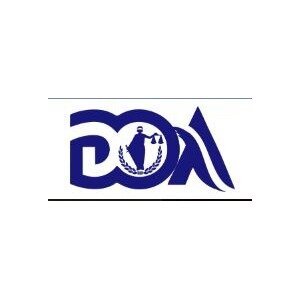Best Financial Services Regulation Lawyers in Ikoyi
Share your needs with us, get contacted by law firms.
Free. Takes 2 min.
List of the best lawyers in Ikoyi, Nigeria
About Financial Services Regulation Law in Ikoyi, Nigeria
Financial Services Regulation in Ikoyi, Nigeria is a crucial area of law that governs the operations of banks, financial institutions, and capital markets within the region. It involves overseeing and ensuring compliance with financial laws to protect consumers, maintain financial stability, and promote transparency and fairness. As one of Lagos' prominent business districts, Ikoyi is home to several financial institutions, making the regulation of financial services critical to its economic ecosystem. Nigerian regulatory bodies, such as the Central Bank of Nigeria (CBN) and the Securities and Exchange Commission (SEC), play vital roles in enforcing these laws and ensuring that financial services operate within the legal framework.
Why You May Need a Lawyer
There are several situations where individuals or businesses may require legal assistance in the realm of Financial Services Regulation:
- Compliance Issues: Businesses often need help to ensure they meet all regulatory requirements, which can be complex and subject to frequent changes.
- Licensing: New or existing financial service providers may need legal guidance on obtaining the necessary licenses to operate legally in Nigeria.
- Dispute Resolution: Legal professionals can assist in resolving disputes between consumers and financial institutions or between financial entities themselves.
- Regulatory Investigations: In cases of regulatory scrutiny or investigations, legal advice is essential to navigate the process effectively.
- Litigation: If issues escalate to legal action, a lawyer specializing in financial regulations can provide necessary representation.
Local Laws Overview
Several key local laws affect Financial Services Regulation in Ikoyi, Nigeria:
- Central Bank of Nigeria Act: Establishes the CBN and outlines its powers, functions, and the regulation of financial services.
- Banks and Other Financial Institutions Act (BOFIA): Regulates banking operations and ensures the stability of the financial system.
- Securities and Exchange Commission Regulations: Governs the capital markets, ensuring they are transparent and fair.
- Money Laundering (Prohibition) Act: Sets rules to prevent money laundering and financing of terrorism within financial services.
- Consumer Protection Framework: Provides guidelines on the protection of consumers in financial services operations.
Frequently Asked Questions
1. What is the role of the Central Bank of Nigeria (CBN) in financial services regulation?
The CBN is responsible for the oversight of the banking sector, ensuring monetary and financial system stability, and formulating appropriate financial laws and policies.
2. How can financial institutions ensure compliance with Nigerian regulations?
Financial institutions should regularly consult legal professionals, stay updated with regulatory changes, and establish comprehensive compliance programs.
3. What steps are involved in obtaining a financial services license in Nigeria?
The licensing process includes submitting an application to the relevant regulatory body, meeting all stipulated requirements, and undergoing a compliance review.
4. What are the penalties for non-compliance with financial regulations?
Penalties can range from fines, license revocation, to imprisonment for severe violations. The specific penalty depends on the nature and extent of the non-compliance.
5. Can foreign investors participate in Nigerian financial markets?
Yes, but they must comply with certain regulations, including obtaining necessary permits from the SEC for certain investment activities.
6. How does the Consumer Protection Framework affect financial services?
This framework ensures that consumers have access to safe, transparent, and fair financial services, and sets out the rights and responsibilities of consumers and financial institutions.
7. How are fintech companies regulated in Nigeria?
Fintech companies must adhere to regulations set by the CBN and the SEC, including obtaining necessary licenses and complying with anti-money laundering provisions.
8. What are the key challenges in financial services regulation in Nigeria?
Challenges include rapid technological changes, ensuring compliance with dynamic regulations, and managing risks associated with financial innovations.
9. How can one report a financial crime or irregularity in Nigeria?
Reports can be made to relevant bodies such as the CBN or the Economic and Financial Crimes Commission (EFCC), depending on the nature of the crime.
10. What are the current trends in financial services regulation in Nigeria?
Current trends include increasing regulatory focus on digital banking, cryptocurrency regulations, and strengthening consumer protection measures.
Additional Resources
Here are some resources and organizations that can provide further assistance:
- Central Bank of Nigeria (CBN): Oversees the country's banking sector and monetary policies.
- Securities and Exchange Commission (SEC): Responsible for regulating the capital market.
- Economic and Financial Crimes Commission (EFCC): Handles investigations into financial crimes.
- Nigerian Deposit Insurance Corporation (NDIC): Protects depositors and ensures financial system stability.
- Financial Services Regulation Coordinating Committee (FSRCC): Facilitates collaboration among regulatory bodies.
Next Steps
If you require legal assistance in Financial Services Regulation in Ikoyi, Nigeria, consider taking the following steps:
- Identify Your Needs: Clearly define the specific financial legal issues you are facing.
- Seek Professional Advice: Engage a lawyer who specializes in financial services regulation for personalized legal guidance.
- Stay Informed: Keep up-to-date with changes in financial regulations that may affect your situation.
- Contact Regulatory Bodies: For specific guidance or to report issues, get in touch with relevant governmental bodies such as the CBN or SEC.
Lawzana helps you find the best lawyers and law firms in Ikoyi through a curated and pre-screened list of qualified legal professionals. Our platform offers rankings and detailed profiles of attorneys and law firms, allowing you to compare based on practice areas, including Financial Services Regulation, experience, and client feedback.
Each profile includes a description of the firm's areas of practice, client reviews, team members and partners, year of establishment, spoken languages, office locations, contact information, social media presence, and any published articles or resources. Most firms on our platform speak English and are experienced in both local and international legal matters.
Get a quote from top-rated law firms in Ikoyi, Nigeria — quickly, securely, and without unnecessary hassle.
Disclaimer:
The information provided on this page is for general informational purposes only and does not constitute legal advice. While we strive to ensure the accuracy and relevance of the content, legal information may change over time, and interpretations of the law can vary. You should always consult with a qualified legal professional for advice specific to your situation.
We disclaim all liability for actions taken or not taken based on the content of this page. If you believe any information is incorrect or outdated, please contact us, and we will review and update it where appropriate.










